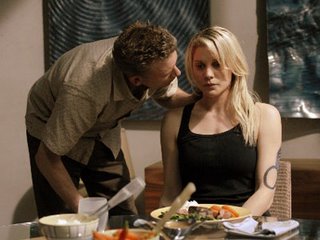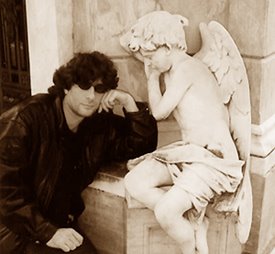
I learned something about myself at
Lisa's. Or perhaps I should say that I
relearned something about myself, because I think I've had this revelation before and then forgot about it.
Back in the cabin I said something about how difficult it is to counsel teenaged girls in poverty because as females without any of the usual power chips (money, status, physical prowess) to hold down, they resort to a kind of survival mode thinking and simply pretend to agree with you until they can get what they need from you or escape your influence. In short, they adopt whatever mask you want them to wear, until you've left the audience. Drugs are bad?
Yeah... That guy is bad for me?
Yeah... Once she's on to your party line, she'll convincingly share that view until you're gone. The pretty little blonde with too much eye makeup has survived you, and she'll survive the next person and the next agenda. And on and on until she doesn't have an iota of a clue who she really is; she's just someone being all things to all people in order to survive.
Then I realised that girl is me.
Am I poor? Not now. I mean, not when I look at my bank account. But there was a day when I was most definitely the working poor with a "you want fries with that?" liberal arts degree. And I wasn't fashionably slumming it while Daddy dearest made the car payments and Mummy sent me brownies to encourage me while I waited for my big break. So I made do. This meant that I, like little blondie above, played the part I needed to play for each audience I faced.
I don't face housing and food survival needs now, and that's a freeing fact. But despite my middle-classness and relative stability, I still don't know who I am. Maybe it's just a woman thing. But even now I bind myself in the clothes of another's expectations. Too often it's an ill-fitting costume that still smells like the last actress who wore it. And frankly, it stinks.
If I'm going to write, I decided, I'll have to create my story from whole cloth. No more guessing at another's second-hand expectations, no more holding back for fear of offense or poor marketability. No tippy-toeing through the CBA tulips as if land mines have been hidden in its flower beds. No more dress-up games.
Which leaves me to be as bad as I wanna be.
Huzzah! you say? Well, actually
not huzzah. I can blather on about drugs or drinking or sex if you want. But that doesn't get to me. On the other hand, if you'd rather I'd not blather on about those thinbgs--if that's your line of offense, then fine. It's an easy line to see and avoid, and that's nothing to me.
The lines I'm most interested in aren't easy to see, and they're damned hard to avoid. And they could hardly be contained in a set of rules. I'm talking about the subtle shifts of the human conscience, the human
soul, as they play out through the day, like shadows moving across the heart. Being as bad as I want to be means watching those shadows, looking for the shifts. I also means getting in close to the human heart.
My favorite show now is
Battlestar Galactica. We get this on Netflix, and now on itunes. And I'm so very hooked. I know I sound like some goofy sci-fi nerd, but I have my reasons for tooting its horn. In the very first episode Captain Adama (Edward James Olmos) laid out the basic question of story and it's the pursuit of that question that I think has resulted in some of the best storytelling on television. And the question is this:
Is humanity worth saving? To answer this question you can't go on a grand tour of the world's great glories of architecture, neither can you point to Man's great acheivements in commerce or science or art or government. To answer this question you've got to reach into the human chest and seize that 11ozs of beating muscle and inspect what's inside. We all know what's there isn't often pretty.
This picture above is from the new season. Kara Thrace (aka 'Starbuck') is a soldier and fighter pilot who long ago once brutally beat the man in the picture. He was caught as a Cylon, an enemy, and brought in for interrogation. But Kara lost her head and the interrogation turned into torture. It wasn't a gory episode, but it was ugly. Now the tables are turned. Kara is the Cylon's prisoner, for what reason we don't yet know. But if he's attempting to kill her, he seems to be killing her with kindness. A different kind of torture. Trapped, Kara plays her part to survive.
She's killed him five times. But Cylons don't die, they just resurrect into new bodies. And still her captor is kind. I suppose there'd be a straightforward Sunday school lesson there about how when we deny or 'kill' Jesus in our hearts, he still returns for us. But the Cylon, no matter how religious he is or how he believes a prophecy about Kara and him (he is and he does), is not Jesus. His motives, as much as Kara's are as shadowy as my own each day. I just don't have dining room dramas where my hubby ends up dead with chopsticks through his neck each night. So who's better here? The trapped soldier polytheistic woman who was once a torturer? Or the fanatical but patient monotheistic Cylon who believes his people (who killed billions of humans) to be morally superior?
For some, the answer to Adama's question could be answered by the accounting method: add up all the bad stuff we've done and subtract it from the good stuff. If there's anything left to the good, then we go on. But if we're left in the negative, then bring on the Cylon toasters! That would be justice, right?
But as a Christian, this question strikes me very differently. According to what I've been taught and have read, God felt that we were worth some kind of salvation.
Why? In my pre-Christian mind I saw ourselves in a goodness deficit, and I didn't have to look far to confirm my view. So if were are in the hole, why pull our butts out? I mean, we did it to ourselves! I got to be as bad as I wanted to be, right? Right. Let me wallow in my own crap. That's certainly a valid kind of justice, too.
And this is the central tension of every story. Does humanity deserve to survive? When we're as bad as we wanna be, why are we offered Good? why do we seek Good? If we don't see the shadows across our own hearts and if we only see through the masks of others' expectations, we'll miss the real questions we must be asking every day.
I want to be the kind of writer who looks.












